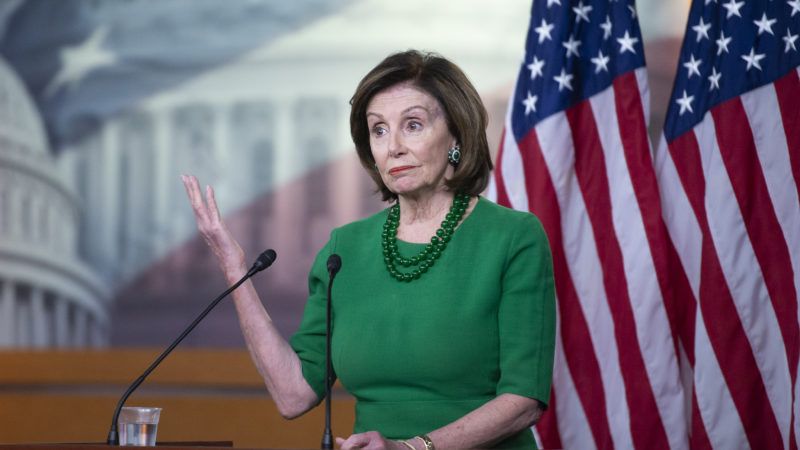Dems Want to Combat Coronavirus By Mandating Paid Sick Leave for Stalking Victims?
The House bill seems to be more focused on leveraging political points than fighting coronavirus. Republicans can relate.

House Speaker Nancy Pelosi (D–Calif.) on Thursday addressed the House's coronavirus appropriations bill, a measure that she says will put "families first." With its blatantly partisan insertions, however, a more apt description would be that it puts Democrats' policy priorities first—some of which have nothing to do with addressing a global pandemic.
The major tenets of the bill are as follows: establish free coronavirus testing; mandate private businesses provide additional paid sick leave; expand unemployment insurance eligibility; strengthen food security initiatives for senior citizens, children, pregnant women, and food banks; increase funding for Medicaid; and bolster unemployment benefits, among other provisions.
While the total cost of the bill is still unclear, it would cost, at a minimum, tens of billions of dollars. The price tag associated with the food portion alone is $1.3 billion; unemployment benefits follow closely behind at $1 billion.
But perhaps the most outrageous part of the proposed legislation is the government-mandated paid sick leave program, which, as the bill currently reads, would be permanent. Should the bill pass, businesses would be federally required to provide seven days of paid sick leave—with or without a pandemic. This provision has little relevance to addressing the coronavirus and much more to do with leveraging the crisis to prop up policies popular within the Democratic Party.
That couldn't be more clear in the legislation's stalking component. The text specifies that, should someone need to miss work due to an instance pertaining to stalking, domestic violence, or sexual assault, or should an employee need to help a friend going through such an event, a private business would be federally required to provide paid sick leave.
What does that have to do with coronavirus?
The bill further carves out an additional 14 days of required paid sick leave in a public health emergency, although in that case, the Department of the Treasury—a.k.a. taxpayers—would foot the bill. Only one provision of the paid sick leave portion pertains to coronavirus specifically: It establishes a federal program reimbursed via Social Security, which would compensate those who contract coronavirus (as well as their caretakers) with two-thirds of their wages.
Even the latter provision is more fantasy than reality. House Minority Leader Kevin McCarthy (R–Calif.) noted that, if set up through Social Security, such a program would take six months to establish.
Democrats aren't the only ones using this moment to further their party's political profile. Take Sen. Tom Cotton (R–Ark.), for example, who issued a press release this morning to avow revenge on "those who inflicted [coronavirus] on the world." He later clarified that he meant China, though what he will do to punish the country for getting sick is still ambiguous.
Correct. https://t.co/Kmjv3j0g2K
— Tom Cotton (@SenTomCotton) March 12, 2020
And President Donald Trump, during a news conference this morning, gave a similarly cryptic declaration. "The question is: how many people will die?" Trump asked. "And I don't want people dying. That's what I'm all about."
Trump isn't about people dying, Pelosi is about "putting families first." I'm sure both of them would like to stem this crisis, but right now they seem all too concerned with scoring political points.


Show Comments (63)